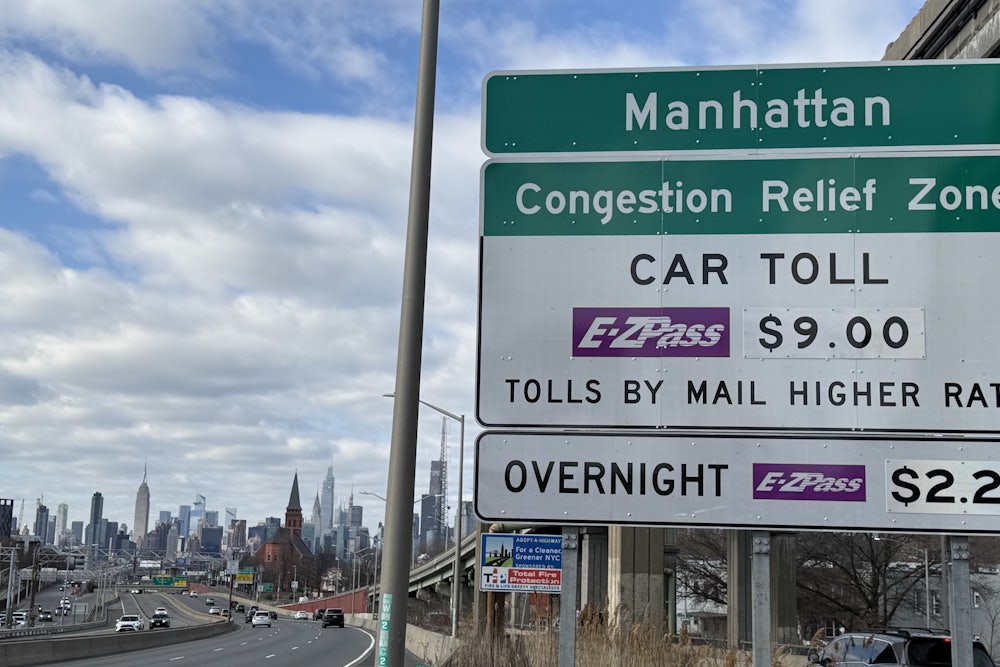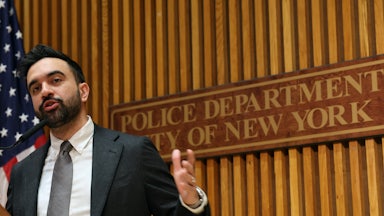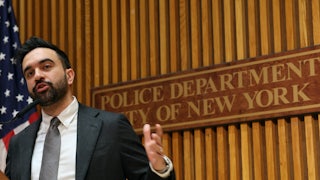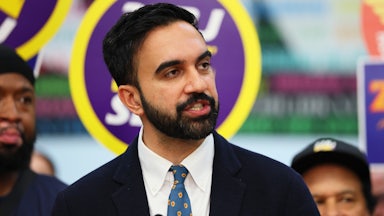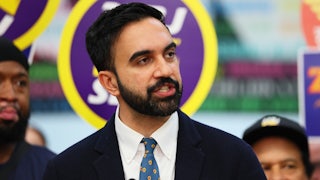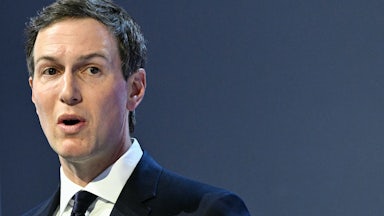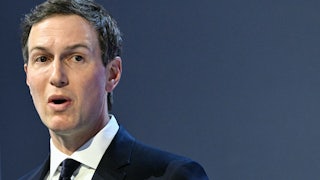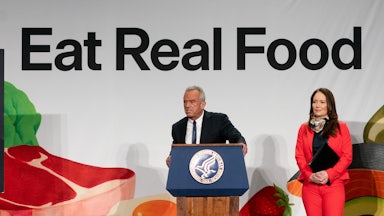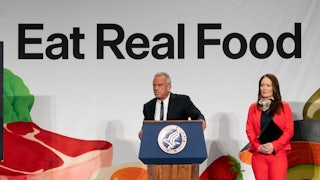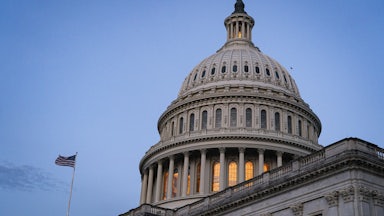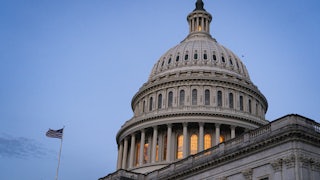To live under the rule of Donald Trump is to lurch from crisis to crisis—one day, a horrifying act of cruelty; the next, a brazen display of corruption. Without a doubt, this state of affairs demands a constant refrain of outrage and disgust from the opposition. Not a day should pass when Trump’s unlawful, authoritarian behavior is not laid bare for every American to see.
But if we want to build a sustainable movement that can consistently win, it’s not enough to go negative. There has to be a compelling vision of the future laid alongside the wreckage of the Trumpian present. The Democratic Party is dealing with record-low approval ratings—not only because many Americans believe Democrats are failing to stand up to Trump, but also because they don’t have a clear sense of what they’re offering in return. Democrats can and should stoke outrage at GOP misdeeds. They also have to cement in the minds of voters that they can deliver something better—and possess the conviction necessary to fight like hell for it.
That brings us to congestion pricing.
Amid the horrors Trump has unleashed in his first few months back in office, New York has rolled out one of the most successful municipal policies in a generation—a model of what capable liberal governance can achieve if given a chance. If you haven’t heard about the success of New York’s congestion pricing policy, maybe it’s because you’re not directly benefiting from it. But it’s also because many of its so-called advocates have gone to some lengths to avoid mentioning it. This is odd behavior; they should be shouting from the rooftops.
The idea behind congestion pricing is simple: charge a toll to drive into Lower Manhattan—the most transit-rich, congested, and pedestrian-packed part of the country—and invest the revenue in public transportation. The toll targets a small, disproportionately wealthy group of drivers, many of whom don’t even live in the city, and forces them to help fund the subway system that millions of people rely upon daily. It’s equitable, efficient, and good for the planet.
The results have been transformative, improving almost every aspect of daily life in New York nearly immediately. In just a matter of months, traffic has thinned, crashes are down, noise complaints have dropped, and subway ridership is up. None of the doomsday scenarios—from runaway price increases to increased traffic in the outer boroughs—have come to pass. It is, without question, a true feat of policymaking.
Naturally, Trump wants to kill it.
Echoing right-wing talking points, Trump and other Republicans have falsely framed the toll as a tax on the working poor—a strange argument, given that the vast majority of working-class New Yorkers don’t even own cars and rely on the public transit system that congestion pricing is rescuing from insolvency. But don’t look toward the economic results if you want to discern the logic of the opposition. Congestion pricing has earned the ire of Republicans precisely because it demonstrates that government can, and should, improve people’s lives. That’s why the Trump administration, despite having much on its plate, has devoted attention to congestion pricing—and is using every tool it has to try and extort New York to turn off the cameras and end congestion pricing altogether.
You’d think Democrats would jump at the chance to fight back. Here’s a policy that improves daily life for millions of New Yorkers, forces red-district suburbanites to help fund public goods in blue cities, and delivers real climate benefits. And Trump wants to take it away—instantly making the city louder, more dangerous, and pushing our transit system into crisis. It’s practically a campaign ad written for you.
Instead, with few exceptions—including Governor Kathy Hochul—Democrats have done what they too often do: duck the fight. For the most part, to the extent congestion pricing has been defended at all, it’s been treated as a technocratic, financial, or legal prerogative, instead of the clear political victory it is—one that deserves a full-throated defense.
And to make matters worse, some local Democrats have gone so far as to actively join the opposition. Christopher Marte, the City Council member representing Lower Manhattan—a place where car ownership is vanishingly rare, transit access is unparalleled, and congestion pricing’s benefits are most vividly felt—has even led protests opposing the policy altogether.
Yes, we’re living through an urgent constitutional crisis, and there are many priorities far greater in scale than congestion pricing. But this fight is emblematic of a much larger failure: the Democratic Party’s allergy to defending its own governing vision—especially in places where it already holds power. And that meekness makes it harder to build the kind of broad, durable anti-Trump coalition we need.
Because it’s not just congestion pricing. In deep-blue cities across the country—where there’s no Republican obstruction to blame—Democratic politicians are often doing far more to entrench the status quo than to fight for the transformative change so many Americans desperately desire. While you’ll often find very little progress on the things that most immediately affect people’s lives—housing costs, transit access, clean, livable neighborhoods—you will find an extensive record of elected Democrats organizing to stop housing construction, prioritizing cars over vibrant open spaces, and shelving infrastructure projects.
As much as Democrats talk about affordability and climate and equity, they too often defer to Nimbys and hedge their language when it comes time to act, all while hoping no one notices. And when they do use their hard-won power to deliver on a big promise, they seem to be content ceding the ground to our opponents, afraid to defend policies that are achieving exactly what we set out to achieve. Congestion pricing may be the most recent example of this phenomenon, but those with longer memories will recall that in the wake of enacting the Affordable Care Act, national Democrats treated their own achievement with an alarming skittishness, as if it were policy poison.
It’s comforting to think that the smaller battles—over a toll charged in Lower Manhattan or a proposed housing development down the block—are just that: small. But eventually, what at first can be dismissed as one-off concessions compound to form full-blown crises.
Skyrocketing housing costs, broken transit infrastructure, noisy, congested neighborhoods—these predicaments didn’t appear out of nowhere. They are the direct result of local leaders who consistently cower under pressure, who are content paying lip service to progressive values but refuse to spend even a shred of political capital defending them. If Democrats won’t defend (or even act on) the very values they claim to hold dear, why should anyone trust them to lead on bigger fights, like defending democratic governance or rooting out corruption? When Republicans unstintingly defend their bad ideas, the reluctance of Democrats to stand behind their good ones sends voters a message about whose spines are the stiffer ones. There is no default victory for the progressive, pro-democracy agenda on the horizon. We either build and defend it—starting with tangible, local solutions that improve life on every block—or we’ll only have ourselves to blame.
